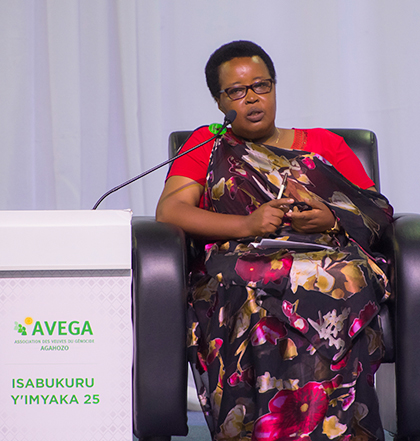Ingobyi Y' Ubudaheranwa!
Toll Free: call 7494 for online counseling
Ingobyi Y' Ubudaheranwa!
Toll Free: call 7494 for online counseling
Our Story: From Tragedy to Triumph
AVEGA, which stands for Association des Veuves du Genocide Agahozo, translates to the Association of Genocide Widows. Founded with a mission to support and empower widows, particularly those affected by the Genocide against Tutsis in Rwanda, AVEGA was legally established through ministerial orders in 1995 and 2006.
At the core of AVEGA’s, efforts are widows of Genocide, women and children, and vulnerable groups, striving to address their
needs and contribute to the healing and rebuilding of the community. With a membership totaling 19,009 individuals and supporting over 71,000 dependents, AVEGA’s reach extends to 350,721 beneficiaries, providing assistance such as shelter, legal aid support, nutrition support, medical aid, and mental health support.
The organization is dedicated to addressing the diverse challenges faced by its members (widows of Genocide, including physical
disabilities, HIV/AIDS, and trauma resulting from the Genocide. AVEGA also focuses on supporting elderly women, particularly those without children, and
children born out of rape during the Genocide. Through its comprehensive approach, AVEGA not only offers immediate assistance but also fosters long-term
resilience and empowerment within its community, ensuring that the legacy of the Genocide is not forgotten and that survivors receive the support they need
to thrive.
Our Story
In 1994, the Genocide Against the Tutsi occurred in Rwanda. More than one million people were brutally murdered over the space of
one hundred days. According to the former Ministry of Administration, Information and Social Affairs, more than nine hundred and thirty of those
victims have been identified by name.
Whilst the world was coming to terms with this horrific event, a group of fifty women met in Kigali. On 15th January 1995, these survivors came together to share their experiences of the genocide. They had all been widowed during the violence and their aim was to provide care, support and comfort to one another.
As their group grew in number, they decided to create an association to help widows and their families across the country. They called this association AVEGA-Agahozo. AVEGA stands for Association des Veuves du Génocide (Association of Widows of the Genocide). Agahozo is a Kinyarwanda word
meaning ‘to dry your tears.’
Today, we have more than 20,000 widows and over 71,000 dependents and genocide orphans among our members. We also work with young
people experiencing transgenerational trauma and with children born to genocide rape. What began as a conversation has grown into a country-wide support
network helping people to start businesses, become financially independent, reclaim lost land and property, and access mental health support.
The organisation was registered as a local non-profit on 30th October 1995, and is supported by the Government of Rwanda, President Paul Kagame and First Lady Jeannette Kagame, the Survivors Fund (SURF), and by organisations and individual donors in countries across the world.
Mission
AVEGA works to foster social justice for widows of the 1994 Genocide against the Tutsi as well as other vulnerable women, children, and families affected by conflicts.
We do this through improving access to healthcare, socio-economic opportunities, and access to justice and by enhancing gender equality, equipping members, women, and children to transform and rebuild their lives.
Vision
AVEGA seeks a nation of optimism where women, children, and families live a dignified life free from all forms of violence.
Values
We believe in equal opportunity as we are all equally responsible for building a better future. It is only through working together, listening to each other and supporting one another that we will achieve our full potential as human beings.
AVEGA History
AVEGA’s commitment to fostering unity and social cohesion is exemplified through the establishment of inclusive health centers for the entire population, aiming to benefit all beneficiaries. In addition, our community programs are specifically designed to cater to the needs of everyone in vulnerable groups, thus promoting a sense of belonging and solidarity among all members of the society we serve. Through these initiatives, we strive to build a cohesive and interconnected community, where each individual is valued and supported, regardless of their background or circumstances. Together, we work towards creating a more inclusive and compassionate society, where everyone has an equal opportunity to thrive and contribute to the collective well-being.
A Title About Avega Aspirations
- Provide holistic gerontological care for members in the dependency stage
- Integrate youth from the members’ families in the structures and programs of the organization
- Provide medical services to the general population
- Collect and preserve the historical memory of the Genocide against the Tutsis
- Build and sustain institutional capacities to consolidate and expand interventions to support members and beneficiaries, and create new jobs.
- Maintain financial growth (increase the number and scope of social enterprises, increase the annual budget, maintain a positive business trend, meet urbanization standards KUGENDANA N’IBIHE)

A Title About Approaches To Change

- Provide holistic gerontological care for members in the dependency stage
- Integrate youth from the members’ families in the structures and programs of the organization
- Provide medical services to the general population
- Collect and preserve the historical memory of the Genocide against the Tutsis
- Build and sustain institutional capacities to consolidate and expand interventions to support members and beneficiaries, and create new jobs.
- Maintain financial growth (increase the number and scope of social enterprises, increase the annual budget, maintain a positive business trend, meet urbanization standards KUGENDANA N’IBIHE)
